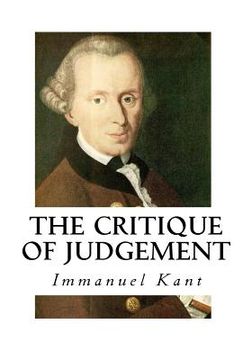Share
The Critique of Judgement: Critique of Aesthetic Judgement
Immanuel Kant
(Author)
·
Createspace Independent Publishing Platform
· Paperback
The Critique of Judgement: Critique of Aesthetic Judgement - Meredith, James Creed ; Kant, Immanuel
Choose the list to add your product or create one New List
✓ Product added successfully to the Wishlist.
Go to My Wishlists
Origin: U.S.A.
(Import costs included in the price)
It will be shipped from our warehouse between
Tuesday, May 28 and
Thursday, June 13.
You will receive it anywhere in United Kingdom between 1 and 3 business days after shipment.
Synopsis "The Critique of Judgement: Critique of Aesthetic Judgement"
The Critique of JudgementPart I: Critique of Aesthetic JudgementImmanuel Kanttranslated by James Creed MeredithThe Critique of Judgment, also translated as the Critique of the Power of Judgment, is a 1790 philosophical work by Immanuel Kant. Sometimes referred to as the third Critique, the Critique of Judgment follows the Critique of Pure Reason (1781) and the Critique of Practical Reason (1788).The faculty of knowledge from a priori principles may be called pure reason, and the general investigation into its possibility and bounds the Critique of Pure Reason. This is permissible although "pure reason," as was the case with the same use of terms in our first work, is only intended to denote reason in its theoretical employment, and although there is no desire to bring under review its faculty as practical reason and its special principles as such. That Critique is, then, an investigation addressed simply to our faculty of knowing things a priori. Hence it makes our cognitive faculties its sole concern, to the exclusion of the feeling of pleasure or displeasure and the faculty of desire; and among the cognitive faculties it confines its attention to understanding and its a priori principles, to the exclusion of judgement and reason, (faculties that also belong to theoretical cognition, ) because it turns out in the sequel that there is no cognitive faculty other than understanding capable of affording constitutive a priori principles of knowledge.
- 0% (0)
- 0% (0)
- 0% (0)
- 0% (0)
- 0% (0)
All books in our catalog are Original.
The book is written in English.
The binding of this edition is Paperback.
✓ Producto agregado correctamente al carro, Ir a Pagar.

